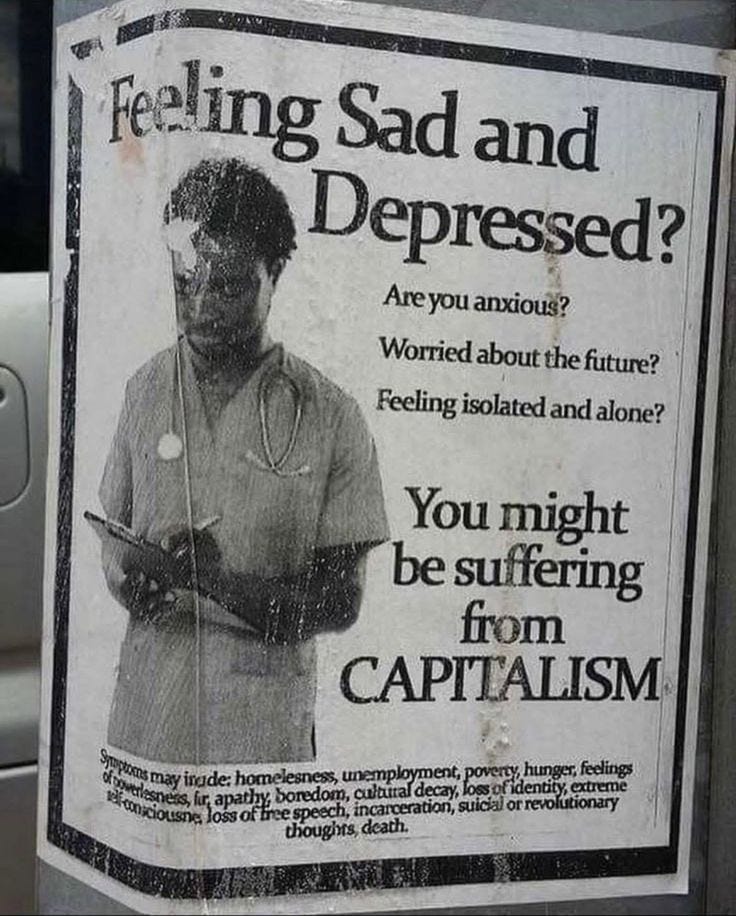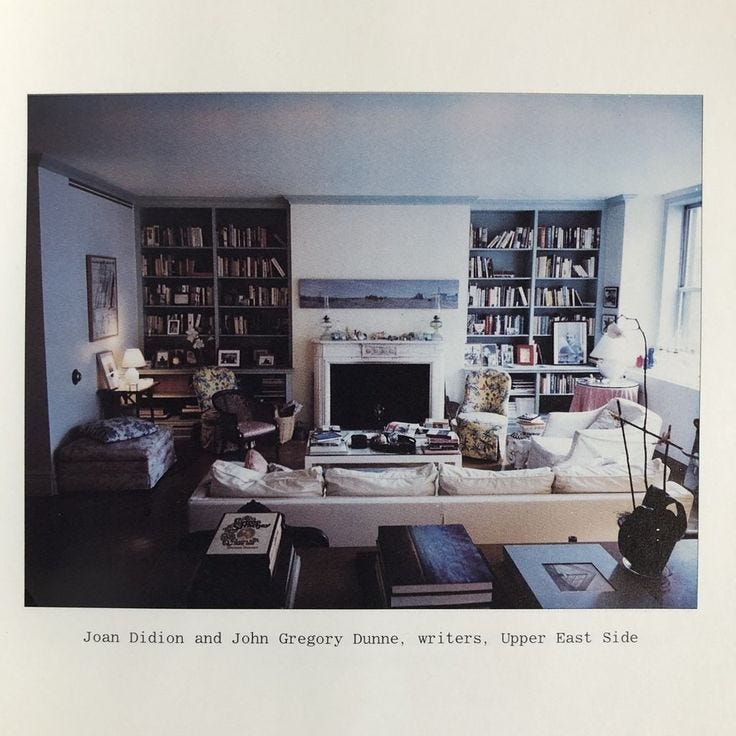Rotting is not therapeutic, you're dying
Seinfeld, leaving my phone behind, and minimalism
The world has changed. ‘No, the world is the same, people have changed’ is what my father would say. It was somewhat true, I suppose the world has always really been the same—even when it hasn’t been the same it was as a result of direct human interference. My father is somewhat of a pessimist, and my mother a nihilist so I don’t know how I came to be so painfully optimistic, only that I am and that is my reality now. So, when I get fixated on something, I simply do it.
The show about the nothing life (Seinfeld)
I was watching Seinfeld for the hundredth time. I started to get a sense of nostalgia even though I’d only experienced a wireless life for such little time. George and Jerry would sit drinking coffee or eating a sandwich while talking about the world’s absurdities. Unnecessary conversation, absurd meaningless debates about toilet seats or the balding crisis. But I liked its randomness, it was intimate and stupid. I liked that they were deprived of a screen, that they didn’t have a vibrating distraction on the table—even facing down—to turn them away from ideal face to face time. Jerry Seinfeld’s Playboy interviewer described the show so well, in it they said:
“living life at its most mundane and uneventful, asking questions such as “Why do I get bananas? They’re good for one day,” confronting what “Entertainment Weekly” called “the little adjustments of daily urban life that no network in its right mind would turn into a sitcom.”
The reason the show wasn’t expected to do so well was because it was too much like life, ordinary and simple with no thick plot, and people usually watched shows to escape the ordinariness of life itself. But, today I find a show like this more grounding to real life because everything else I do is constantly in pursuit of escaping. I listen to music every second I’m outside, I scroll on the subway, I text waiting in line, I watch a show to cook, I put on a podcast to do my chores, I’m almost always elsewhere. I don’t think people before today knew what ‘grounding meditation’ was, or how to use your senses to calm anxiety (not that they didn’t get anxious, just that they didn’t have the means to escape so much that they needed a breather to come back down to Earth). When our house had its first desktop computer, the slowest piece of shit that ever existed, I used it to escape the chaos at home or school. I moved so often, but on the internet it felt so big and overwhelming, it took me out of my mind. In a good way. Now, I’m trying my hardest to escape the internet and hold on to whatever is left of my real world. The balance between both worlds is hard to maintain.
The subject of conversations, I find, the more absurd and unexpected, the more entertaining the company gets. Certain topics evoke certain reactions, the more commonly asked ‘how’s work?’ makes someone anxious or somewhat detached, they may even ask you to change the subject. But if you ask a question so absurd—like how many owls would you have to see in a day before you get suspicious—the less likely anyone would reject it because they aren’t familiar with their own answers, therefore, cannot have a reaction. They uncover their thoughts as you talk. Even when they made phone calls on the show, they instinctively lowered the television noise or shushed whoever was there (or whoever was there just shut up because talking wasn’t to be disturbed). The truth is, even if both me and my friends say we won’t be using our phone for dinner, it still feels like there’s an intruder sitting amongst us. Not in a totalitarian-the-government-is-listening way but in a there’s something-that-could-potentially-ring-at-any-second-with-something-to-rip-us-from-the-conversation way.
The male-loneliness epidemic is majorly a lack of communication epidemic. Men have a harder time maintaining connections, and their friendships are virtually shallow compared to women’s, they crave this deep intimacy in a world that doesn’t prioritize it. Women also suffer from real communication and genuine relationships now more than ever, just not as much as men. With new cultural ‘advice’ on being a type of woman that adheres to specific traits, she becomes just another genre rather than being herself. And genres don’t know how to have genuine connections/conversations. You meet someone, but they put you in a box with other ‘types’. This affects our friendships, even our dating lives. It becomes increasingly commercial or dumbed-down. People are people, not types, categories, and filters. We need to realize that genuine talking and listening is crucial to human existence and experience. Without it, we are all in a loneliness epidemic in need of an escape. In comes porn, scrolling, consuming, and obsessing.
I also hate that we have to announce the fact that we will be spending our time together with no screens.
“Hey we’re putting our phones away the whole dinner”
“Yup tonight it’s just us, no screens”
“Oh cool let me send one last text…oneee seccoonnndddd...aaaannnnndddddddd…done! Okay I’m here”
Announcing that we’re putting the intruder to rest in order to hangout with each other is absurd because isn’t that what we came out here to do? It would be like calling your friend to meet you at the bar, but you show up with your mail as they sip their beer while you sift through, reading each letter carefully, writing back and licking stamps. You can hope for a ‘do not disturb phone facing down on the table’ or you can get outta there. There’s also a feeling of meaningless conversation—by meaningless not that it doesn’t go anywhere, but it’s simply deprived of any interest or enthusiasm. When George talks about how much he hates bringing gifts to a dinner party, and Jerry responds to educate him on the fabrics of society, the conversation doesn’t go anywhere but they give it the importance of responding genuinely. Because they genuinely like each other and they’re genuine friends and it’s genuinely absurd and entertaining. I don’t think it’d be funny or comedic had their interactions been too fictional; they all seem to move through life alongside each other. With the absurdities. Not afraid to say what is honestly on their minds, no matter how much of a villain it makes them seem or how unlikable they can be at times. Jerry will look his friends in the eye and say “I need to date a giver, I’m a taker.” his selfishness is identified, but so is his honesty and transparency.
When, however, I’m sitting while my friend taps away, no matter how many times she repeats “I’m listening”, it feels unnecessary to even say anything at all. I think sometimes you don’t want a listening ear, but an enthusiastic one even if all we’re talking about is the design flaw of bar stools. Ultimately it’s a performance, even when you’re there because the person is somewhat detached from who they are in the digital world. The personalities don’t align. I’m guilty of it as well (more on this later).
So how do you even find the purpose of seeing someone or going out? Is that why we’re so obsessed with staying in, rotting, even getting anxious before going out, or wanting to bail with every fiber of our being? Why do we rely too much on ‘the apps’ instead of going up to people in real life? Why is there a divide in our preconceived notions of other people? And how the fuck can we bring back genuine, face to face, and intriguing-not-so-intriguing conversations? Keep reading.
You—the person who got dressed up and spent stupid money on an Uber to come out here—are the momentary and that the phone—a rectangular marvel of ingenuity that connects to someone much more important than you—is the main act. The talk you have fills in until the more important text pops up, your conversation is essentially just batter and the phone is the real date. Even if we do put the phones out, it’s almost like watching some people go through withdrawals without it at least in their peripheral vision. Have you witnessed the panicky pat-down with a half whisper and wide-eyed ‘my phone!’ after leaving a restaurant, as if they’ve left their child behind or lost a kidney?
It may sound absurd, but that’s the only way I can redeem whatever once of creative liberation I have left. To purposely leave it behind. The fresh young brains send weak signals of projects that never get lift-off because the dopamine high is so momentary. The dent in my iPhone pinky is getting ridiculously deeper, I sometimes cannot physically get out of bed without checking something. Anything. I deleted all my apps, I wiped out my social life, but I still wanted that scroll, that blue-light with barely functioning eyes first thing in the morning. One morning I found myself scrolling through my emails, just for something to nibble on before I had the courage to get out of bed. I mean how pathetic is that? Emails. I cannot express how humiliating it felt to walk out of the bathroom while brushing my teeth, thinking ‘was I really just scrolling through my email account for an hour?’. Yes. I really was.
I didn’t grow up with a phone, I lived through a period of no screens, but my first phone wasn’t as impressive as what it is now. The world has changed. Perhaps it was the technology shield my father had built around our home that fueled my now-addiction, nonetheless, I feel comfortable going tech-free, I just don’t think the world is and—in my adult days now—it’s awfully discouraging.
I broke up with him to get my liberation
A while back I wrote an essay about the root of anxiety, what could signal distress and make young folks spiral. (Click here to read it). The first point I made was that the phone was occupying too much of my time. In that I even admitted:
“I’m only alive for 19 and a half days out of the month, the rest, I may as well be sedated in a coma. This relationship is sucking the life out of me, I need to break up with my screens.”
I told myself, before starting this experiment, that it was too unrealistic to simply toss my phone aside. The little thing has my bus card, credit cards, music, and cell phone, it’s near impossible to let go of it altogether. I’m tied to it, my entire social world is built on it, my entire physical world depends on it. As a precautionary measure to test this out, I left my phone home every time I went out for a whole week. I still used it when I was back in my apartment, but as soon as I left the house, I had to leave it behind to see just how necessary it was.
I reached for it instinctively a few times, but besides that I got on pretty smoothly. I had my wallet, I just tapped cards like I would my phone. I used the actual subway card as opposed to the virtual one. I wasn’t able to listen to music on my walks, but that was fine by day three. I was good with directions and using maps. I just trusted the signs and numbers with my instincts—turns out you don’t need to be crazy smart for that. So yeah, bullshit. You can definitely live without a phone altogether.
You do miss out on the newest trends and in’s or out’s, but you just have to be okay with it. I understand that it’s not always about how ‘useful’ some content is, that unwinding while the brain rots is arguably a kind of liberation. The worst kind perhaps. Too much rotting though makes your body physically ill, your joints rust and mind slows down reverting to ancient monkeys before Darwinism (and not the kind they sent to space—refer to Figure No.3).
But if the fear of missing out on the latest trend is holding you back, just know that the internet is an ever-growing cancer that multiplies by the second. A new thing sweeps everyone off their feet within a week, you won’t ever escape the loop. You will always have something on there and money-hungry companies won’t stop making money to save you. I hardly think it’ll be revolutionary, so might as well just miss out on it. If it’s political updates you want, you can pick up a newspaper or even turn on the news channel. Magazines still have fashion advice, stories, and there are literary magazines in every corner. Being left behind while everyone is within that screen bubble is okay, you don’t need to be pretentious about it, but you don’t need to be relatable either. People who really want to reach you will find a way.
“Do stuff. be clenched, curious. Not waiting for inspiration's shove or society's kiss on your forehead. Pay attention. It's all about paying attention. attention is vitality. It connects you with others. It makes you eager. stay eager.”
Susan Sontag
I do see that at some point in the near future, everything might be completely unusable without your phone. That travel will be harder, that some of the facilities will be inaccessible, but I don’t think we’re there yet. You can still travel, move, and dine without your phone. Having some flip-phone or dumb phone will definitely help make emergency calling easier, but you can 100% live without one altogether. Before everything becomes unusable unless you’ve got your phone, maybe experience the world without it while you still can.
Minimalism, Capitalism. (tomato, tomahto)
During that ‘test-week’, I had to once print an actual train ticket because I couldn’t just show them the confirmation. It’s not a bother, once you adjust and reap the rewards of the absent screen, it feels normal. Also kind of liberating to just spend more minutes on something.
I don’t know why everything is designed to be ‘efficient’ ‘easy’ and ‘tap on’, yet we as a society feel as though we’re always behind schedule. We have no time-management skills and we’re always running late even though everything is designed under the guise of saving us so much time. Maybe too much efficiency isn’t as good as it’s advertised. When everything you might need is in a little block that fits inside your pocket, you find yourself looking for something to do. And since it’s got everything sorted for you—like printing tickets, finding MapQuest routes, buying batteries for your flashlight, a new sim for your camera, news updates—what’s there for you to do but waste whatever time you’ve got left?
We need to have more stuff.
Minimalism was only created to convince us that we really don’t need much, that consumerism has swallowed us whole and this was our only way out. But it eradicates the flavor you have, the touch of authenticity.
Minimalists believe they can live in a 80-square foot place with only a mattress and kettle. But you are meant to be a museum of everything you’ve loved and experienced, you need stuff that matters. Believe it or not, I find the atrocious samurai sword in a man’s apartment a hundred times more authentic than a sculpture his interior decorator picked out. I like to sort through physical books on people’s shelves or their music collection, it’s more telling than their Instagram or Hinge profiles. When choosing a song for your carousel, with a click and no cost, you can alter your perception to whoever sees it. No matter how authentic you try to be, it will always be somewhat performative. The books you choose to take photos of, the specific clothes, the drinks and restaurants—things that cost nothing to post, but shape someone’s image of who you are. You are less likely going to spend actual dollars on a vinyl you hate simply because you look better having purchased it. If the only way you can have stuff is by compromising how neat your place looks, be messy. Stuff matters.
Exhibit A.
So for nearly a month, I replaced whatever my phone offered with physical stuff. My purse was heavier, my brain was unprepared and there was a lot on the line for me. I started getting anxious, not about separating with my phone, but there was a fear of things going wrong. I had depended on my phone so much that without it I worried about getting lost, missing an important phone call, or text. None of them happened, but it was pathetically kind of scary.
I locked my phone up for a month, and had one hour of laptop screen/internet time. I had the TV and nothing else, it was….interesting. This post took nearly two months to draft up, so I hope you enjoy the sweat that went into it.
Read more under the paywall!
This post is brought to you by a new section I call ‘The Rabbit Hole’. Where I write about fixations I’ve had in a stream of words fueled by curiosity and a lot of free time. Stay tuned for more and consider becoming a paid subscriber to enjoy the rest of these series. Enjoy.
Keep reading with a 7-day free trial
Subscribe to Covered to keep reading this post and get 7 days of free access to the full post archives.










